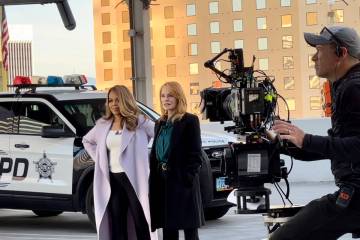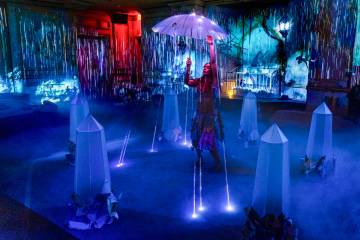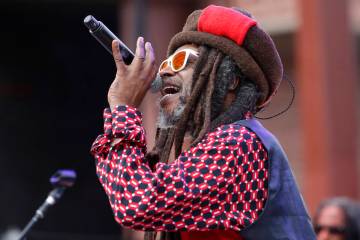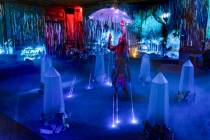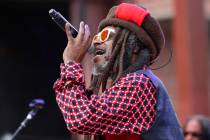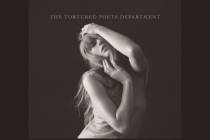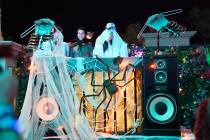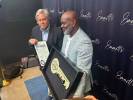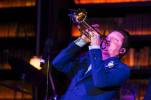All-female Diva Jazz Orchestra comes to UNLV
Bio-musically speaking, if XY chromosomes can swing the stage, why can't XX chromosomes rattle the roof?
"It's so funny, some of the old Down Beat magazine articles -- 'Reasons Why Women Can't Swing,' " recalls drummer/bandleader Sherrie Maricle. "Things like, 'Women can't smear their lipstick so they can't play jazz trumpet,' or 'Women can't blow too hard or their uterus will fall out.' "
That could wreck a hot jazz lick, huh? Fortunately, no cause-and-effect has been documented. (Imagine the mess.) Such long-ago Down Beat drivel shrivels when the members of the all-female Diva Jazz Orchestra hit their own down beat, as they will Sunday at the University of Nevada, Las Vegas, along with UNLV's Contemporary Jazz Ensemble.
Gender-bender jazz, anyone? "Some guys make a joke, like 'Oh, can I wear a dress?' " Maricle says. "That's silly, because no one wears a dress, though you can if you want." (Drumming in a dress would seem inadvisable anyway.)
To close your eyes and open your ears to Maricle's 15-piece aggregate is to hear grooves that echo the Stan Kenton bunch, riffs redolent of the Woody Herman gang and the throbbing heartbeat of Maricle's Buddy Rich-inspired power percussion. "I was driving and I had KUNV on, and I heard this amazing big band," says Dave Loeb, UNLV's director of jazz studies, barely containing his admiration for these sisters of swing.
"It was this strong sense of swing, with solos that were very mature, rooted in the vocabulary of jazz, and that was before I knew if they were men or women, just this roaring, intoxicating dynamic."
At the core of the band's creation was Rich's relief drummer/manager Stanley Kay. Appreciating Maricle's percussive prowess, he suggested she search for similarly talented women who eventually congealed into the Divas in 1992. Despite her respect for "an endless sea of great drummers," Rich's muscular, testosterone-fueled style remains the lady's jazzy raison d' etre.
"The first group of his I heard was called Buddy Rich and his Killer Force," she recalls. "It was in the '70s. I remember finding humor in the fact that his band was dressed in tuxedos and he wore a black T-shirt. Seeing him perform live really got me interested in playing the drums, got me to love concert big-band music, especially."
Sexist silliness was the first hurdle. In grade school, itching for an instrument, she told a music teacher she wanted to blow trumpet. ... Nope. Too macho for a little lass. She was handed a metal clarinet. ... Nope. Not her niche. Next? The cello. ... Nope. Not a match. Next? Volunteering for duty on that band behemoth and catchall instrument when a kid's not a comfy fit for any section: the bass drum.
That put her on her path, though as she tended toward big-band jazz, ripe with a musical aggression reserved for men, cynicism followed. "I don't think anyone who goes into jazz, regardless of gender, thinks of (sexual stereotypes), especially as a kid, until other kids start saying, 'Hey, girls can't play drums.' You're like, 'Really?' You become aware you're doing something not a lot of girls-slash-women have done before."
Even though pioneers such as pianists Marian McPartland and Lil Hardin (Louis Armstrong's second wife) had infiltrated the jazz patriarchy, Maricle felt deprived of such inspiration. "There are a lot of great women instrumentalists in jazz history, but you have to look for them," she says. "There was a trumpeter named Clora Bryant I became aware of several years ago who was an amazing performer. And I wondered, how come when I was learning about Louie Armstrong and Dizzy Gillespie, no one told me about Clora Bryant?"
She signed on for that cheesy rite of passage, the wedding/bar mitzvah circuit. "I wouldn't necessarily suggest this attitude, but I was studying music that I revered while playing professionally -- and believe me, I was grateful for the paycheck -- a lot of parties and weddings," says Maricle, who gigged on one too many of the latter.
"We were playing 'Hi-Ho-the-Dario' ('The Farmer in the Dell'), which is 'The Bride Cuts the Cake.' It must have been 20 minutes, it went on for ages. I just flung my sticks and went and sat at the bar and I thought, I'm not going to play this anymore, I'd rather find a path where I can do a better service to music and myself."
And so -- no offense to whatever wedding bands haven't yet yielded to DJs -- she has. On that journey, she even had a brief, albeit brusque brush with the man who awakened the rhythm in her heart when, as a high school kid, she approached the Buddy Rich tour bus. "He was in his bathrobe. He goes, 'Whaddaya want, kid?' 'Oh, can I get your autograph Mr. Rich?' He signed the paper and kicked me off. He wasn't unpleasant, though I wouldn't say friendly."
Such are the risks of meeting one's idols. Yet musically, he remains exalted. "It came on jazz radio that he had died, and I burst into tears," Maricle says. "He was amazing, exalted, on a pedestal."
A position she perhaps now occupies for little girls with jazzy dreams, confident it will challenge only their chops. Not their uterus.
Contact reporter Steve Bornfeld at sbornfeld@reviewjournal.com or 702-383-0256.
PREVIEW
Sherrie Maricle and the Diva Jazz Orchestra with the UNLV Contemporary Jazz Ensemble
4 p.m. Sunday
Judy Bayley Theatre, University of Nevada, Las Vegas, 4505 S. Maryland Parkway
$10-$20 (895-2787)




